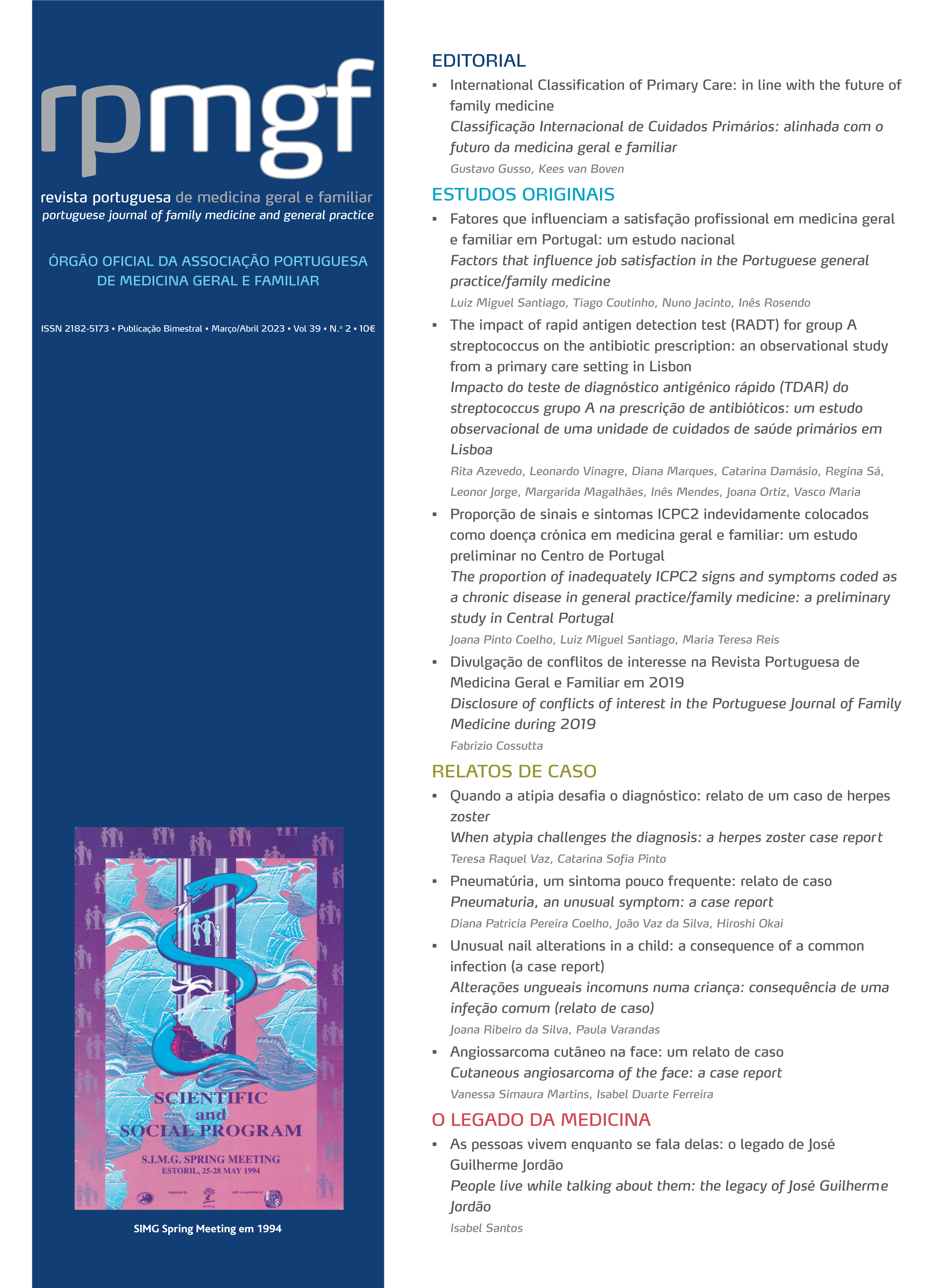ENGLISH
DOI:
https://doi.org/10.32385/rpmgf.v39i2.13468Palabras clave:
Point of care testing, Pharyngitis, Streptococcus pyogenes, Antibiotics, Primary health careResumen
Introduction: Acute pharyngitis is a common diagnosis in primary care. Although viruses are the most common aetiology, antibiotic therapy is frequently prescribed. The inappropriate antibiotic prescription should be avoided to prevent antibiotic resistance. Many national and international guidelines recommend testing for group A streptococcus (GAS) before antibiotic treatment when clinical presentation suggests GAS infection.
Aim: This study aims to describe the feasibility of the implementation of the rapid antigen detection test (RADT) in a primary care setting and its impact on antibiotic prescription. Secondary goals include the evaluation of possible associations between symptoms and RADT results.
Methods: From October 2019 to March 2020, patients presenting with acute pharyngitis at USF do Parque were eligible. A questionnaire was applied to divide the individuals into four different groups (clearly viral, probably viral, diagnostic doubt, and probably bacterial), and to assess the previous intention to prescribe antibiotics. We applied 136 questionnaires and performed 133 RADT. Nursing staff classified the specimen collection process and result from interpretation according to its difficulty. The proportion of antibiotics avoided was estimated as the number of times physicians changed their intended antibiotic prescription following a negative RADT result.
Results: Among the tests performed, 97.7% were easy to interpret. Without RADT, 45 patients were going to be prescribed an antibiotic. After the test result, 27 antibiotic prescriptions were avoided. Tonsil hypertrophy, palatal petechiae, and fever increased the odds of a positive RADT result. Cough was associated with a negative RADT result.
Conclusions: This study showed that RADT is easy to implement and contributed to appropriate antibiotic prescription. Tonsil hypertrophy, palatal petechiae, and fever were significantly associated with a positive RADT result, and cough was associated with a negative RADT result. Primary care centers would benefit from having RADT available when there is strong suspicion or doubt of bacterial pharyngitis.
Descargas
Referencias
Direção-Geral da Saúde. Diagnóstico e tratamento da amigdalite aguda na idade pediátrica: norma nº 020/2012, de 26/12/2012. Lisboa: DGS; 2012.
Cohen JF, Bertille N, Cohen R, Chalumeau M. Rapid antigen detection test for group A streptococcus in children with pharyngitis. Cochrane Database Syst Rev. 2016;7(7):CD010502.
MedStar Health Antibiotic Stewardship. The diagnosis and management of pharyngitis in adults clinical practice guideline [Internet]. MedStar Health; 2000 [updated 2020 Sep; cited 2023 Jan 6]. Available from: https://www.medstarfamilychoicedc.com/-/media/project/mho/mfcdc/pdf/clinical-practice-guidelines/diagnosis-and-management-of-pharyngitis-in-adults-final-september-2020.pdf
Coutinho G, Duerden M, Sessa A, Caretta-Barradas S, Altiner A. Worldwide comparison of treatment guidelines for sore throat. Int J Clin Pract. 2021;75(5):e13879.
Linder JA, Bates DW, Lee GM, Finkelstein JA. Antibiotic treatment of children with sore throat. JAMA. 2005;294(18):2315-22.
Kulik E, Stuart B, Willcox M. Predictors of rheumatic fever in sore throat patients: a systematic review and meta-analysis. Trans R Soc Trop Med Hyg. 2022;116(4):286-97.
ESCMID Sore Throat Guideline Group, Pelucchi C, Grigoryan L, Galeone C, Esposito S, Huovinen P, et al. Guideline for the management of acute sore throat. Clin Microbiol Infect. 2012;18 Suppl 1:1-28.
Maltezou HC, Tsagris V, Antoniadou A, Galani L, Douros C, Katsarolis I, et al. Evaluation of a rapid antigen detection test in the diagnosis of streptococcal pharyngitis in children and its impact on antibiotic prescription. J Antimicrob Chemother. 2008;62(6):1407-12.
Gunnarsson R, Orda U, Elliott B, Heal C, del Mar C. What is the optimal strategy for managing primary care patients with an uncomplicated acute sore throat? Comparing the consequences of nine different strategies using a compilation of previous studies. BMJ Open. 2022;12(4):e059069.
Sarangarm P, Huerena TA, Norii T, Walraven CJ. Antibiotic prescribing in adults presenting with pharyngitis pre- and post-implementation of a rapid group A streptococcus test. Hosp Pharm. 2022;57(2):309-14.
Shaikh N, Leonard E, Martin JM. Prevalence of streptococcal pharyngitis and streptococcal carriage in children: a meta-analysis. Pediatrics. 2010;126(3):e557-64.
Cots Yago JM, Alós Cortés JI, Bárcena Caamaño M, Boleda Relats X, Cañada Merino JL, Gómez Gabaldón N, et al. Guía clínica para el manejo de la faringoamigdalitis aguda del adulto [Clinical guide for the management of acute pharyngotonsillitis in adults]. Farm Comun. 2015;7(1):20-31. Spanish
Wi D, Choi SH. Positive rate of tests for group a streptococcus and viral features in children with acute pharyngitis. Children. 2021;8(7):599.
Agence Française de Sécurité Sanitaire des Produits de Santé. Antibiothérapie par voie générale en pratique courante dans les infections respiratoires hautes de l’adulte et l’enfant: argumentaire [Antibiotic therapy in general and current practice in upper respiratory tract infections in adults and children: arguments]. Med Mal Infect. 2005;35(12):578-618. French
Aslam B, Wang W, Arshad MI, Khurshid M, Muzammil S, Rasool MH, et al. Antibiotic resistance: a rundown of a global crisis. Infect Drug Resist. 2018;11:1645-58.
Descargas
Publicado
Número
Sección
Licencia
Derechos de autor 2023 Revista Portuguesa de Medicina Geral e Familiar

Esta obra está bajo una licencia internacional Creative Commons Atribución-NoComercial-SinDerivadas 4.0.
Los autores otorgan a RPMGF el derecho exclusivo de publicar y distribuir en medios físicos, electrónicos, de radiodifusión u otros medios que pueda existir el contenido del manuscrito identificado en esta declaración. También otorgan a RPMGF el derecho de usar y explorar el presente manuscrito, es decir, de ceder, vender o licenciar su contenido. Esta autorización es permanente y entra en vigor desde el momento en que se envía el manuscrito, tiene la duración máxima permitida por la legislación portuguesa o internacional aplicable y tiene un alcance mundial. Los autores declaran además que esta transferencia se realiza de forma gratuita. Si la RPMGF informa a los autores que ha decidido no publicar su manuscrito, la cesión exclusiva de derechos cesa inmediatamente.
Los autores autorizan a RPMGF (oa una entidad que éste designe) a actuar en su nombre cuando considere que existe una infracción a los derechos de autor.





